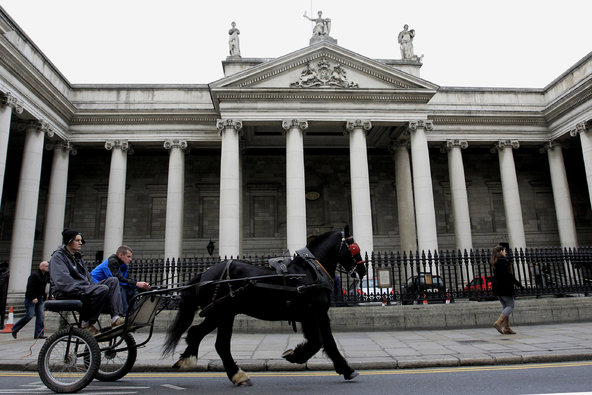 Peter Morrison/Associated PressThe Bank of Ireland in central Dublin.
Peter Morrison/Associated PressThe Bank of Ireland in central Dublin.
Investors’ appetite for Bank of Ireland bonds has changed a lot in the last four years.
In September 2009, the Irish lender, which received a 4.8 billion euro ($6.2 billion) bailout during the financial crisis, was forced to offer investors a return of around 4.6 percent to sell $1.3 billion of three-and-a-half year bonds.
Yet when the bank returned to the European corporate bond market last week, the yield, or interest rate, had almost halved, to 2.75 percent, on its $650 million of unsecured three-year bonds.
Related Links
More important, the issuance was almost three times oversubscribed, as investors clamored to secure access to the relatively risky bonds.
“Ireland has recovered strongly in the past couple of years,” said Christopher Whitman, global head of risk syndicate at Deutsche Bank in London, which helped sell the bonds to investors. “Many credit investors are now comfortable with Ireland, as well as with the Bank of Ireland.”
The demand for the Bank of Ireland’s bonds is the latest example of the credit boom that is gripping Europe.
Despite concerns about the Continent’s wider economy, companies including global giants like Siemens and Barclays as well as smaller local firms have issued more than $430 billion of bonds this year, according to the credit ratings agency Standard Poor’s. In contrast, companies in the United States have pocketed around $380 billion.
The bonanza has eased the short-term financing troubles for many of Europe’s struggling companies.
With banks cutting back on lending to meet more stringent capital requirements, the debt markets have provided companies an opportunity to refinance maturing loans, often at reduced interest rates. The new financing has also helped offset the impact of dwindling sales caused by the financial crisis.
Even in debt-ridden southern European countries like Greece and Portugal, companies have found willing bondholders to back new issuances.
The Greek oil-refining company Hellenic Petroleum, for example, raised $650 million in four-year bonds on April 30, after it offered investors an annual return of 8 percent. Portucel, a Portuguese paper manufacturer, also won backing in mid-May for its seven-year bonds worth a combined $455 million. The company had offered investors a return of 5.4 percent.
In total, European companies have issued $64.1 billion of high-yield bonds this year, almost double the amount compared with the same period in 2012, according to the data provider Dealogic.
Europe’s banking sector has also gotten into the financing act.
Faced with regulatory demands to increase their financing reserves, a number of large European financial institutions, including UBS of Switzerland and BBVA of Spain, have issued so-called contingent capital, or CoCos, to fill the void.
These complex financial instruments offer bondlike returns to investors, but convert to equity — or, in some cases, wipe out bondholders’ investments altogether — if a bank’s capital falls below a certain threshold. European banks have raised almost $5 billion through these products this year, and analysts expect more issuances by the end of the year.
“CoCos are an attractive option for some of Europe’s largest banks,” said James Longsdon, a managing director at the credit ratings agency Fitch Ratings.
While Europe’s corporate and financial sectors have benefited from the near record amount of bond issuances so far this year, analysts worry that investors may be setting themselves up for trouble.
As demand for new corporate bonds has outstripped supply, many investors are now looking to buy debt from noninvestment grade companies in the so-called high yield market.
These companies once had to guarantee double-digit returns to entice investors to part with their money. Now, the average coupon, or return, on offer in the European high-yield market has fallen to around 6 percent, almost an all-time low.
For some, that still represents a healthy return.
But other investors fret that the falling yields do not compensate for the dangers associated with backing these somewhat risky companies. The returns have plunged in the last 12 months because more investors are fighting for access to the bonds, which allows companies to reduce the interest rate payments that they offer to bondholders.
For analysts, the concern is that investors may face major losses if companies cannot repay the borrowed money when interest rates start to rise.
“Investors will get absolutely shellacked,” said Robin Doumar, managing partner of Park Square Capital, a company based in London that invests in debt financing. “As rates rise, investors will get savaged by both interest rate and credit risk. This will end in tears.”
Article source: http://dealbook.nytimes.com/2013/06/02/bank-of-ireland-bond-sale-confirms-a-credit-boom/?partner=rss&emc=rss